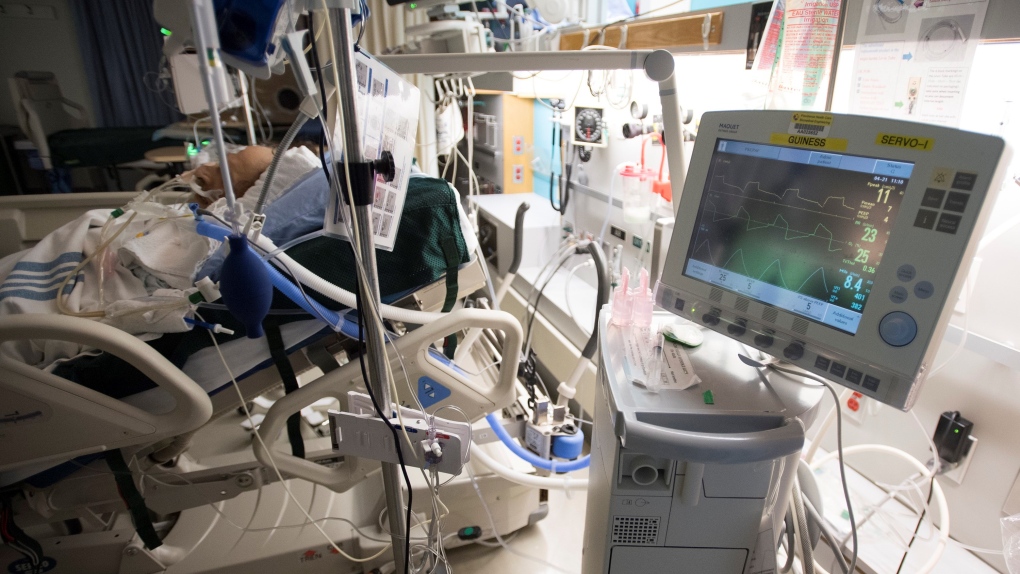Fewer than 50 COVID-19 patients in B.C. ICUs as of latest update
 A patient is attached to a ventilator in the COVID-19 intensive care unit at St. Paul's hospital in downtown Vancouver, Tuesday, April 21, 2020. (Jonathan Hayward / THE CANADIAN PRESS)
A patient is attached to a ventilator in the COVID-19 intensive care unit at St. Paul's hospital in downtown Vancouver, Tuesday, April 21, 2020. (Jonathan Hayward / THE CANADIAN PRESS)
COVID-19-related hospitalizations and intensive care admissions continued to fall in B.C. on Friday, according to the provincial Ministry of Health.
The number of coronavirus patients in ICU in B.C. Friday was 46, the first time that number has been below 50 since last summer.
Overall, there are 368 test-positive COVID-19 patients in B.C. hospitals, a figure that includes both those with serious illness and those who were admitted to hospital for other reasons and tested positive incidentally.
The ministry does not report the number of hospitalizations in each category in its daily update. Health officials have previously estimated that roughly 40 per cent of hospitalizations are incidental.
Declining hospitalizations and caseloads have prompted health officials to lift most COVID-19-related restrictions in the province, including the mask mandate for indoor public spaces, which ended at 12:01 a.m. Friday.
The last time there were fewer than 50 people receiving COVID-19 treatment in intensive care units in B.C. was Aug. 16, 2021.
Friday's update also saw three more COVID-19-related deaths, all of them in the Fraser Health region. Since the pandemic began, a total of 2,935 deaths have been attributed to the coronavirus.
Many of those who died were residents of long-term care. No new outbreaks were reported in such facilities on Friday. There are 14 COVID-19 outbreaks currently ongoing in B.C.'s health-care system.
Data from the B.C. Centre for Disease Control indicates that unvaccinated people are overrepresented, relative to their share of the population, among the province's hospitalizations, ICU admissions and deaths.
As of Friday, 90.7 per cent of eligible people ages five and older in B.C. have received at least a first dose of a COVID-19 vaccine, and 86.6 per cent have received two shots.
Among adults, 58.4 per cent have received a booster dose.
Friday's update also included 288 newly confirmed cases of COVID-19, though that number is not considered an accurate reflection of transmission of the coronavirus in the province.
B.C. only administers PCR tests to people for whom a positive or negative result will inform decisions about treatment or care. That means people who are admitted to hospital, people who are pregnant, people who are at risk of more serious illness and are eligible for COVID-19 treatments, and people who live or work in congregate living settings with others who are at high risk.
Others who have symptoms of COVID-19 cannot get a PCR test, and are therefore not included in daily case counts.
Rapid antigen tests are becoming more readily available in the province, however. As of Friday, people ages 50 and older can pick up rapid tests for at-home use for free at participating pharmacies around the province.
CTVNews.ca Top Stories

South Korean president says he will lift martial law after lawmakers vote to reject his move
South Korean President Yoon Suk Yeol said early Wednesday that he would soon lift the military rule he imposed overnight, after the parliament voted to reject his martial law declaration.
Should Canada be America's 51st state? Trump was 'teasing us,' says minister
Prime Minister Justin Trudeau will meet with all opposition leaders today before question period to brief them about his meeting with U.S. president-elect Donald Trump.
Canada Post strike: Kids no longer need to mail their letters to Santa by the end of the week
Canada Post says it has removed the deadline for its Santa Claus letter program amid an ongoing national workers' strike that has halted mail delivery leading up to the holiday season.
Canadian woman stranded in Syria as civil war escalates
It is the first time control of the city has shifted since 2016, when government forces, backed by Russia and Iran, defeated the rebels who controlled Aleppo's eastern districts.
Man severely injured saving his wife from a polar bear attack in the Far North
A man was severely injured Tuesday morning when he leaped onto a polar bear to protect his wife from being mauled in the Far North community of Fort Severn.
Jaguar reveals first concept car after controversial rebrand
British luxury automaker Jaguar has revealed its Type 00 concept car, the first glimpse of a new electric vehicle following a controversial rebrand that has divided opinion.
Video shows 'completely unprovoked' stranger attack in Vancouver, police say
Police in Vancouver are searching for witnesses after a seemingly random and unprovoked assault was captured on video in the city's downtown core.
Young Manitoba woman dies after medical emergency during dental appointment
The Manitoba Dental Association (MDA) said it is investigating a critical incident where a young woman from the Morden-Winkler area died following a dental appointment.
Billboard names Beyonce the greatest pop star of the 21st century
Beyoncé has been named the greatest pop star of the 21st century by Billboard, the music charting site announced on Tuesday as part of an ongoing series.

































